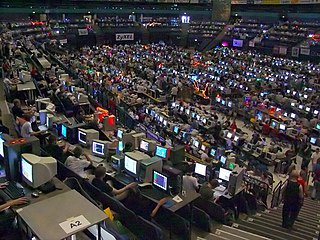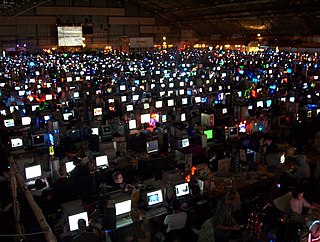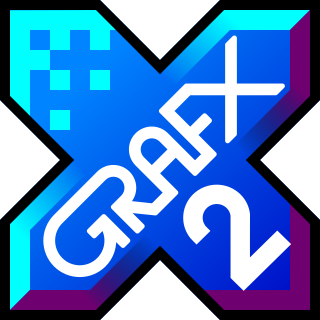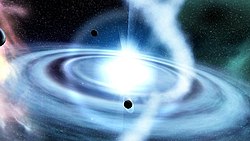
Amiga demos are demos created for the Amiga home computer.

Demogroups are teams of demosceners, who make computer based audio-visual works of art known as demos. Demogroups form a subculture collectively known as the demoscene.

The demoscene is an international computer art subculture focused on producing demos: self-contained, sometimes extremely small, computer programs that produce audiovisual presentations. The purpose of a demo is to show off programming, visual art, and musical skills. Demos and other demoscene productions are shared, voted on and released online at festivals known as demoparties.

Future Crew was a Finnish demogroup that created PC demos and software, active mostly between 1987 and 1994.

The Assembly demoparty is a demoscene and gaming event in Finland. It is the biggest demoscene party. The main organizers of the event are Pekka Aakko and Jussi Laakkonen. The Summer event takes place every year between late July and early August, and lasts three to four days, and the Winter event is held in January or February. Edition 2020 was online. The most recent Assembly was held from 3 to 6 of August 2023 at Messukeskus in Helsinki.

A LAN party is a social gathering of participants with personal computers or compatible game consoles, where a local area network (LAN) connection is established between the devices using a router or switch, primarily for the purpose of playing multiplayer video games together. LAN party events differ significantly from LAN gaming centers and Internet cafes in that LAN parties generally require participants to bring your own computer (BYOC) and are not permanent installations, often taking place in general-use venues or residences.

The Gathering is a computer party which is held annually in Vikingskipet Olympic Arena in Hamar, Norway, and lasts for five consecutive days. Each year, TG attracts more than 5200 people, with attendance increasing every year.
tAAt is a Finnish humor-based demogroup founded in 1992 which is active in participating and organizing demoscene events. They are recognized outside of the demoscene for their Dismount series of computer games, including Stair Dismount (Porrasturvat), Truck Dismount (Rekkaturvat) and Dismount Levels.

Breakpoint was an annual demoscene party held in Bingen, Germany during Easter from 2003 to 2010. The successor to Mekka & Symposium, an annual German demoscene party that had ended in 2002, Breakpoint grew to become the largest annual event focused solely on the demoscene. It attained over 1000 visitors at its height, attracting demosceners from Germany, Sweden, Finland, Poland, Spain, Australia, and Canada, among others. It was also the host of the Scene.org Awards ceremony from 2003 to 2010.
Tristar and Red Sector Incorporated (TRSI) is a demogroup which formed in 1990. It came about from the longest-running cooperation in scene history. RSI existed from 1985, before being joined by the "T" later on. Evolving from the Commodore 64 to the Amiga and later to PC and various game console platforms - like the PlayStation, Xbox, Nintendo - and set-ups like Arduino, Android or Blu-ray, TRSI released a number of digital productions, dedicated to experimenting in phreaking or network alteration. Its members were spread around the world and still contribute to computer scene art and code after more than 27 years of history.

A disk magazine, colloquially known as a diskmag or diskzine, is a magazine that is distributed in electronic form to be read using computers. These had some popularity in the 1980s and 1990s as periodicals distributed on floppy disk, hence their name. The rise of the Internet in the late 1990s caused them to be superseded almost entirely by online publications, which are sometimes still called "diskmags" despite the lack of physical disks.

Jesper Kyd Jakobson is a Danish composer and sound designer who has worked on various video game, television, and film projects. He has composed soundtracks for the Hitman series, Assassin's Creed series, Borderlands series, Darksiders II and State of Decay, among many others. His scores use orchestra, choir, acoustic manipulations and electronic soundscapes.

Hugi is one of the longest lasting, frequently released demoscene and underground disk magazines (diskmag) for IBM-PC.

Protracker is a music tracker for the Amiga platform. A free software tool that required no additional equipment, it became popular in the early 1990s with both amateurs and professionals, allowing for sample-based music in the MOD file format.
The 2007 dance-pop song "Do It" performed by Canadian singer-songwriter Nelly Furtado features elements sampled from "Acidjazzed Evening", a chiptune-style track composed by the Finnish demoscene artist Janne Suni. This was considered plagiarism by some. Timbaland, "Do It"'s producer, admitted to sampling Suni's work, but did not believe his usage constituted "stealing", calling the allegations "ridiculous". Although users had noted the similarities between the two tracks on Finnish demoscene forums in July 2006, the Timbaland plagiarism controversy attracted mainstream attention in January 2007, when Internet users posted videos to YouTube alleging Timbaland had plagiarized Suni's work. Soon afterwards, the controversy attracted the attention of the Finnish news portal eDome, and the MTV and Rolling Stone websites, who all published articles detailing the events of the controversy. "Do It" was released as the fifth North American single from Loose on July 24, 2007.

GrafX2 is a bitmap graphics editor inspired by the Amiga programs Deluxe Paint and Brilliance. It is free software and distributed under the GPL-2.0-only license.

Razor 1911 (RZR) is a warez and demogroup founded in Norway, 1985. It was the first ever such group to be initially founded exclusively as a demogroup, before moving into warez in 1987. According to the US Justice Department, Razor 1911 is the oldest software cracking group that is still active on the internet. Razor 1911 ran the diskmag 'Propaganda' until 1995.

Revision is a demoparty which takes place on Easter in Saarbrücken, Germany. It is the successor of the Breakpoint party series, and retains many of the organizing staff. The event was established in 2011, after Breakpoint had announced its end in 2010.
Phenomena (PHA) was a Swedish Demogroup making Amiga demos that was productive during the formative years of the Amiga Demoscene founded in 1987.

Chaos Constructions is the oldest demoparty in Russia, previously known as ENLiGHT. Nowadays, it is considered to be annual computer art festival and IT conference.









